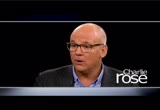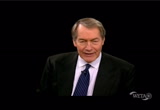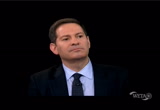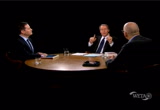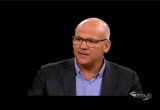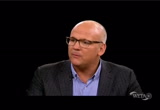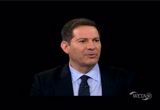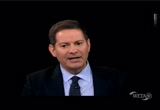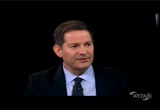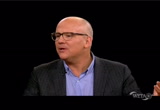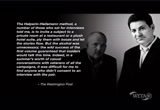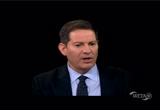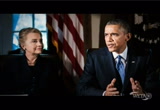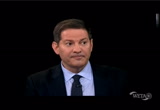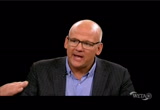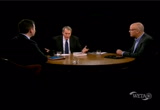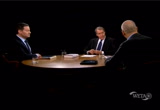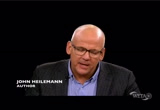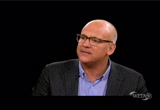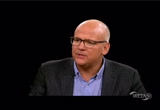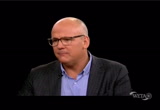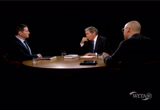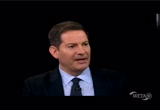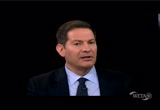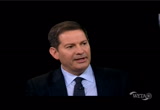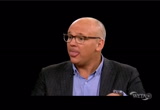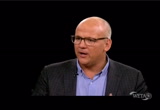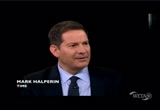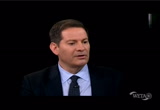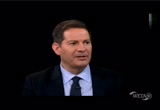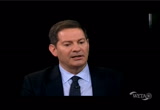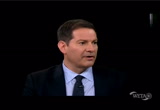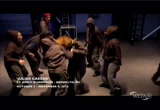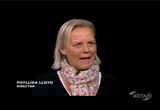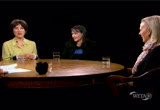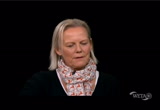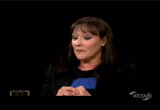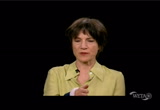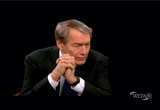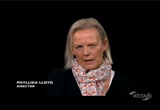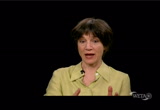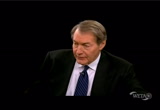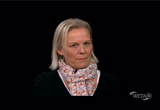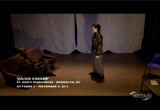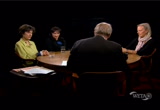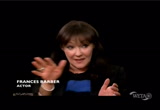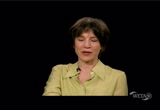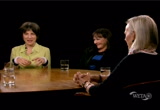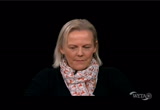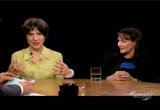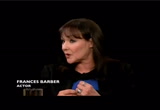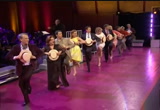tv Charlie Rose PBS November 5, 2013 11:00pm-12:00am EST
11:00 pm
>> rose: welcome to the program. we begin this evening with mark halperin and john heilemann, they are the authors of "double down", the story of the 2012 election. >> we look at petty white books and we look at hunter thompson and ben cramer and look at all of them as" dolls and icons and models as we try the best we can to stand on their shoulders and get somewhere close to how good they are but they are all models for a certain kind of thing which was deconstructing, take, peaking behind the curtain and there is a public at that sad of campaigning which has grown more elaborate and more -- more successful in the sense that more and more is concealed from the public. >> rose: we conclude this evening with the story of julius
11:01 pm
caesar, a new production in new york, the director's phyllida lloyd and two of the stars, harriet walter and frances barber. >> people come to rehearsal and say, my boyfriend, you know, asked me what i was playing in this and i said, zero disuse, brutus and said i played that, christ. what is going on here? >> .. i think it is important to have an all female production throughout history. they get murder yo buried in history like a lot of family history does and not just that famous brutus that went to brooklyn, it is much more. >> rose: politics from the 2012 election to a new production of julius caesar, when we continue. funding for charlie rose was provided by the following. . this summer we got the ball rolling. in cities across the country, coca-cola joined with communities and local leaders to roll out a summer filled with activity.
11:02 pm
from atlanta to la, people all over found that getting moving can be fun. in fact, it can be -- it is part of our commitment to inspire people everywhere to rediscover the joy of being active. now let's keep it going all yearlong and make a difference together. >> rose: additional funding provided by these funders. >> captioning sponsored by rose communications from our studios in new york city, this is charlie rose. >> >> our first order of business is to recover all the jobs and wealth that was lost in the crisis. and we have made strides in the
11:03 pm
last three and a half years to get that done. but beyond that, we are here to reclaim the financial security that has been slipping away for more than a decade. the decade before i came into office your incomes and wages generally weren't going up. >> rose: one year ago president obama scored a landslide victory over mitt romney, to secure a second term in the white house, the new book "double down" is a behind the scenes account of the 2012 campaign. it is in some ways a sequel to game change, the best seller that told the story of the 2008 election cycle, i am pleased to welcome my friend, the authors, john heilemann national affairs editor for new york magazine, mark halperin is editor at large and senior political analyst for time magazine, i am pleased to have them back at this table. welcome. so you have done it. you have told the story of 2012. how does it compare to 2008? >> well, both elections were,
11:04 pm
obviously, feature barack obama as the main character. both elections featured the clintons as very important figures, quite obviously, and i think this election in some ways feature higher sex, and, stakes and a greater question about the outcome, so both of them are at a time when the country is really searching for meaning, lot of books about politics are about macroeconomics or about social trends of demographics, our books, both this book and game change are about the high human drama of what it is like to be running for president and be married to someone running for president and in that they are very much the same. it involves real people who are human and real pressure. >> rose: what is the difference between this book and teddy white in 1960? >> oh that is such an unfair question. charlie because you breathe in company of such an iconic
11:05 pm
figure. you know, we take and look at teddy white's books and hunter thompson and richard ben cramer and look as icons and models that we try as best we can to stand on their shoulders and get somewhere close to how good they are but they are all models for a certain kind of thing which was deconstructing, taking people behind the curtain and showing people there is a public facade of campaigning, which has grown more elaborate and more -- moreful in the sense that more and more is concealed from the public than -- the art of manipulation are more advanced now than they were in teddy white's times but all of those books and authors were trying to do the same thing which is try to strip it down and say this is actually what was going on. >> rose: i would think the opposite of that because when teddy did it first and now we have so, we have so many ways to dig into the whole process and so many more devices that it would be so much more possible
11:06 pm
to cover the story and tell more. >> well, yes and no. i think there is an irony there is certainly more coverage than ever before because of more outlets. >> rose: daily journalism. >> right and minute-by-minute journalism and the irony is, because there is so much and the candidate are so wary of it you don't have anything like the access if you are a daily reporters even the television reporter with a lot of access you don't have anything like the access people had in teddy white day. even at the beginning of my career, 1992 i would fly in a small plane with governor clinton and talk, so much access to bill clinton on that campaign there were nights on the charter where he would come back to talk to us and we would pretend to be asleep because we spent the day talking to him but now the theeld is so absolute, 500 long interviews, not short interviews and part of why we were able to get stories that don't come out during the campaign is because it takes a lot of interviews and a lot of matching up interviews and going back to people and
11:07 pm
cross-checking to get the kind of behind the scenes, so it is not cash it is not possible to, impossible to get little bits of it but if you want to tell the whole story you need time doing it and that is not possible with the demands of daily journalism. >> rose: is it easier because you have done it before and they say here comes halperin and heilemann and they know the book will get a real reception and they want to make damned sure their story, their perspective, their side of the story is told? >> you know, we worked on the last. >> rose: and not report it the next day. >> well there is that, we worked on the last book and we did -- we worked on it for a shorter period of time and did fewer interviews with fewer people because we did it for a shorter period of time. this was for three years. in both instances we wanted to talk from candidates to spouses, high level, mid level staffers, low levels, the caddies and the drivers and talk to everybody top to bottom and in both cases only a handful of people that we wanted to talk to wouldn't talk
11:08 pm
to us in both cases. that doesn't mean it was easy in both cases, in fact it took an he for mouse amount of time and effort and we had to beat stories down sometimes but in both case it is truth is, basically people want to tell their stories. >> rose: and that's why the book -- >> and they think what they are involved in is important to history and important to, they worked hard on it and they want the story told and they want it told accurately and fairly and i think they trust us to do that. >> rose: so who wouldn't appear? who wouldn't talk? >> we talked, we can't talk to who we don't talk to but it is a very small subset and it is really like pushing on an open door to sit with people, because we sit with people for a long period of time, i mean, many cases after the action is over and we sit with them and say tell us your yo your stories, i know you come with, we don't come with an agenda and we come with open arizona. >> rose: there is this woodward and bernstein they had very different skill sets, do you two have different skill sets. >> we do everything together and
11:09 pm
part of why it worked as a collaboration is because we recognize that two people in the room doing interviews, two people outlining chapters and two people writing chapters all of that is better when you have two people doing it we generally see eye to eye editorially we don't have a lot of disgeeps about who to interview and what to ask but on the margins having a second brain involved in the process is great, and just to go back to the interviews, we are talking about people cooperating and, you know, we both love to interview people. it is the most interesting part of the process but these are not adversarial interviews, with few exceptions. >> rose: because you get more information that way. >> but also because it ised just not the style of the book we are doing but as i said, we generally in the interviews, rarely you rarely have something that the other was. going to ask the same question. >> rose: so the thrust of most of the giewfs is tell me what happened and why? >> and to piece things together, we are trying to tell a story that involves people. you know, people in campaigns are very
11:10 pm
busy people and so you can ask somebody what happened a week ago and they will say, i have no idea, so finding the people who remember, who are credible, and then cross-checking everybody's story who has knowledge of something, it is a long time and a lot of work but again the ability to have people know us, trust us, understand what we are doing and to cooperate so that if we say to someone, everyone else in the room remembers it this way you are the lone hold out how do you explain that, to be able to assess dissenting voices because the way we write the book on the only nicialt, omniscient voice, but we have to find a consensus .. if i use the word gossip would you accept that? >> no, because and we sort of -- you know, bridal at that a little bit. >> really? >> not that it is something unconfirmed, everything in this is reported to the standard both of us have learned and used over our entire profession and we don't put in things to titillate but to illustrate the high human
11:11 pm
drama of what it is like to run for president. if we wanted to write a gossipy book using low standards and things that were just titillating we would get a ton of attention. >> rose: and you couldn't put them in because you couldn't confirm them. >> we can butt them in gossip but not confirmed fact. >> rose: what is the rule. >> the rule is a normal journalistic rule. >> rose: sources -- >> let's say we did this book in 1972 and president nixon said to us, i am very concerned that theeingly is going to hurt my chance of reelection. no, in that case you wouldn't need a second source, that president nixon was concerned about the economy if he said it to us in an interview, so two sources in many cases. >> rose: you were there and somebody in the room said this happened, then a and somebody else said it did not happen -- >> then we keep going back and try to figure it out. live is not a consensus we don't put it in the book. >> is that right? >> yes, we leave a lot of stuff out that people using different standards may put it in. i mean a lot of the book has -- these books both have very
11:12 pm
novelistic qualities and the truth is there are some cases where good source is good enough, attesting to what their thoughts and feelings are, one source is fine in some cases, a fact, two sources are thing, if the hinge is documented in an e-mail or audio recording again one source is enough. if we are reconstruct ago scene seven sources is what it takes to make sure we have the dialogue in the given scene. the standard, we try to apply the deliberate professional standards to what any given situation requires, sometimes it is one source and sometimes two and sometimes six. >> but there is nothing in the book if you look at the definition of gossip there is nothing in that book that is unverified. >> rose: what is the narrative here? >> it is a narrative nonfiction and in some sense it is not that different from what a lot of writers that you and i and mark all admire and have been doing for a long time in business coverage and technology coverage and sports coverage, we are not doing anything here, we are reinventing the wheel you can look at all of those areas in the last 40 years from the
11:13 pm
time in the mid sixties journalist started writing like novelists like dialogue and scenes and recreating things and we cite all of the antecedents going back but those doing this in a reliable way, famous people have been doing this for the last four decades and we feel we are continuing in that tradition and when we be it the stuff in the book we feel that we need to be able to be 100 percent confident that no one in the room is going to stand up and say it didn't happen that way and so our standards of caution are just extremely high. >> rose: all right. this quote from peter hanby in the washington post, the halperin heilemann method, a number of those set for interviews told me, he would invite a subject to a private room at a restaurant or a plush hotel suite, ply them with booze and let the stories flow but the alcohol was unnecessary the wild sblg of the first volume guaranteed that insiders would talk this time, indeed in a summer's worth of casual conversation with veterans of all the campaigns, it was
11:14 pm
difficult for me to find anyone who didn't consent to an interview with the pair. >> well -- >> rose: what do you any of that?. i will cherry pick on that. we wouldn't to have the first interview to have interviews conducted over meals. >> and a nice beverage. >> i would say i can think of a few of dozen in the 500 interviews that involved any alcohol whatsoever and it was futzer than a dozen a glass of wine or two into sure. >> we had a lot of cooperation, but it didn't come easy in one sense as john said before but it does in a sense as i said, we have known almost all of these people a long time, we are very respectful of their time and very respectful in terms of preparation, so that we, the interviews are productive for them and people finally like to tell their story, but want to be part of what a lot of them think will be pretty -- one of the definitive accounts of the campaign. > >> rose: if before this book was published and they came to both of you and said, what is
11:15 pm
the one-story in here that you think is the most interesting, newsworthy, what would you say. >> that intervention with the president on the eve of the second debate, which involves a look into the mind of barack obama as a person, as a politician, as someone running for reelection that we think is as illuminating about him as any scene anyone has written. >> i totally agree, what do you any? >> i would never want to dissent from the two of you. there is a reason why it is right there on the cover of the magazine. >> rose: new york magazine by the way. >> >> rose: but there was so much talk about that polling about hillary, i just thought it was just silly, i thought. the only question i have about it is did they tell the president, did the president sign off on in and was this something he was interested in the answer? i don't know the answer from your piece. >> look, to talk about that and then to get to intervention, i think when the white house chief
11:16 pm
of staff and people like david enough and axelrod say this presidency is in real peril the president may not get reelected let's consider bringing in hillary clinton and bill clinton to join the ticket i think that is news. >> rose: but did they say that or we just have to test everything? did they say let's really consider bringing in. let's test it and see. >> rose: let's test it and see and consider bringing in -- >> poll comes back that it didn't show much of an impact and the poll say it in helped the president 12 points in the race and widen the gender gap. >> rose: they would have said let's consider that. >> but -- >> rose:. >> we are not -- >> we are no charge of all of the coverage of our book so it is not like we trumpeted that above everything else in the book. >> rose: somebody did. >> jonathan martin wrote about it in the new york times and decided it was newsworthy, look the story -- >> rose: it was not the biggest story. >> the story had been rumored for a long time. >> rose: right. >> and widely denied by the
11:17 pm
white house and i will say that, you know, in the course of the reporting of the book, this was not the easiest hinge to confirm, because they considered it a big secret. >> rose: yes. now, whether -- we both, all agree there are much more powerful human interesting and newsworthy stories in the book, in our opinions, but people inside the obama white house at the highest level considered that a very closely guarded secret and they did it for a reason. >> rose: because they didn't want to offend the vice president. >> maybe and because it also attached i think as bill daly said publicly just how low the president's political standing was in the polls and it was one of the things that the people -- >> a popular morning program. >> it is one of the things. >> rose: a popular morning program. >> it is one thing that people forget that really comes through in reading the book is just how much the president's people, you know, when the election was over, everyone, you know, especially some people hooked back and said oh this was all in the cards from the very beginning, the economy was beginning to approve the
11:18 pm
approval ratings were not that bad and when they say that to us and that's not what the president's people thought, including the president in the fall of 2011, at the time when the hillary clinton testing took place they thought they were at best a 50-50 gamble and possibly the underdogs at that point, given the president's ratings and where the bad economy was and there is a a drama, even embedded in that story the context of that hillary, biden story, it tells you something about just how bad off the president and his people thought he was, not that far out from reelection. >> we are extraordinarily proud of the reporting of the intervention. >> rose: and you should be. >> i tell you why, because that was another story no one wanted us to get. >> rose: there ask something about dash there is a more interesting story than the polling, because it reveals something about the president. a president we think is the most confident person we have ever seen. you. >> you asked in the beginning what the difference was in the two books we had an an incumbet
11:19 pm
and one challenge about writing about the democratic is presidents get covered a lot so we had today, what could we say about barack obama that would be new and different and revealing in the context of the campaign, and this scene on the eve of the second debate when the whole country, when the whole -- >> and the president's weren't until he had a collapse of two days before the debate when he is practicing with john kerry standing in as mitt romney, the events leading up to that conversation, at that practice session and after when they do an intervention with him, the day before the second debate, again, the people should read it and see, it is extraordinarily revealing about how the president thinks and feelings, which with this president is hard to get at normally. >> rose: what did he say and what did he think and what did he feel? >> he had been struggling, charlie, with two different problems throughout the whole period of debate prep up to before the first debate and in the second which were, you know, on one hand he was -- he thad this long-term historic, we discussed this on the program on
11:20 pm
more than one occasion, disdain for the they at cal at this and the showmanship of politics for a person who was as extraordinary, whose performance skills carried him as far as barack obama's did he distrusted political performance and he hated televised debates, on the other hand he has personal and political contempt for mitt romney and trying to balance out those things led him into a quagmire before the denver debate, he swore he could bounce out of it coming out of denver and seemed to be on the right track and then kind of latches back to a worst place in this bad mock, two nights before hofstra, they get him in this room, the morning after that mock, david axelrod, david enough, jack lew and the .. debate coach the four of them and say basically, mr. president what is wrong with you? you know, you are not doing this. something is going on inside your head that is keeping you from performing the way you need to perform to win this election because we think that the voters
11:21 pm
might accept one bad debate performance but if you do another thing like denver which is, which last night was even worse than that you could lose the whole election. >> and this is what david plouffe said if he does this again we could lose the conversation they had to have the conversation with him and here he is on the cover of the magazine i am not wired in the way that this event requires. i don't know if i can do this. in is as unnatural for me as asking me i am left-handed and asking me to write with my right hand i am lost and expressing a discomfort with the kind of campaign he has been running all yearlong people have been criticizing him for not having enough of an agenda, his team is telling him to run run on his agenda. >> rose: and he said. >> i don't really have that big of an agenda, i am not running on the kind of plans i ran on in 2008 and i am frustrated by that, what am i supposed to do here, it is kind of an extraordinary moment all of the people who have seen seen a lot and known barack obama well, they all felt, they were in
11:22 pm
uncharted territory here with the president and having existential crisis three weeks before election day and 36 hours before the most important debate of the cycle, it is a kind of rivetting dramatic thing. >> rose: mitt romney. when you look at romney we had a series of things come up, he was on i guess meet the press on sunday talking about this. what emerges on the part of this man who also had a certain confidence in himself, because he had been very successful in business, and he had been governor an there is some reservation about running. >> yeah. >> rose: himself. >> i think the most, there is so many, there is small, there is discreet nuggets and headlines but one of the overarching things hardly no one has focused on the book so far is the extraordinary kind of ambivalence he shows throughout the process, ambivalence about getting in, ambivalence about how to proceed at certain times, gas receive at this in the face of challenges, over and over
11:23 pm
again, he is almost the opposite of the guy with kind of the fire burning in his belly who is determined to run, determined to win, do whatever it takes, i mean, there are a series of things in the book where, you know, particularly late in the campaign, where you see him confronted with mistakes that his campaign made or he made, acute things like the 47 percent which we go into a lot of detail where -- >> yes and his campaign it seems as though it is on the ropes and the republicans think in at the on a death spiral and we portray him in the book as kind of having a dark night of his soul wondering if he just blown his chance to beat barack obama thinking there is a good chance he might and more than that, that this thing, this thing he considers a mistake that he has made, that he expressed himself inartfully and he is getting, i believe, blamed, mischaracterized what he has said, again whether you think he is rationalizing or not, but he believes this might be his epitaph and yes ket, even though hhe has all of that on top of hm and he is self flagellating to
11:24 pm
an extreme degree he never does anything that is kind of dramatic to try to solve this problem, and this is true throughout the entire arc of the election he is a guy the obama campaign painted as if he were the archetype of ambition, calculating, scheming all he wants to be president and throughout the book, throughout "double down" you see him as anything but that. not to say he is more valiant but say he is much more ambivalent and much for passive in the face of challenges than you could possibly imagine. >> rose: there are so things to talk about here and i want you guys to come back, you have been doing a lot of interviews and so am i. there is this too. the question that has now gotten some play with chris christie for the governor of new jersey on election day, what is that issue here with respect to the vetting of chris christie? >> well, governor romney was interested in a running mate who would help him, and interested in a running mate who would not
11:25 pm
hurt him, he didn't want somebody who would be a big distraction he asked five people. >> rose: go ahead. >> five people to be, to be vetted, and they asked those five to turn over documents. four of the five didn't think they would be picked and that included governo governor criste only one who thought he had a good chance was portman from ohio he handed over some documents but eventually governor romney decided this is too risky because governor crist city has get some things this his background that he thought might be controversial he didn't want to pick someone and then spend two, three, four weeks where the press is scrutinizing he wanted someone to be a safe pick so he took him off the list and stewart stevens, governor romney's top advisor said we are in a street fight and losing the media war in the guess you need the best street fighter on the ticket and considered him again and in that, there was not sort of your classic mitt romney months, meticulous, slow, they had to crash vet him in 11 days
11:26 pm
and in the course of that time two things happened, one is governor crist city did not send in all the materials in a timely fashion. >> rose: any particular reason? >> well, some people say that he didn't because he was busy, but other people say he didn't send stuff in because he didn't think he was going to be picked and he didn't want to bother, you know, complying with every little request, he thought some of the requests, he and his people thought some of the requests were unnecessary. beth myers who was running the selection process for governor romney told her team of veters, look, if they are not sending stuff back we will have to assume the answers are bad not that we don't have the material but assume the worst case so he didn't send stuff back, the other thing that happened was, governor romney and his advisors were alarmed by what they were getting, most of the stuff as governor christi said since the book came out was in the public record, but as governor romney said to an advisor he said look this stuff has all been dealt with before, no he was right about this, stuff that comes out when you are running for governor of sniewnl not stuff coming out when you are on the
11:27 pm
ticket or running for president himself so the implication we think for governor crist city who looks like he is trying to run for president is, he is going to have to handle this stuff in a much, in a much tighter nike scope, much more scrutiny, than he did and a window into that is what governor romney's very experienced vetting team, the lawyers looking at christi's background, the regular red flags and ultimately for romney that got a report al. >> reporter: from them, after all the reports were done, several weeks later me gets a report about governor crist city, read it, a report we quote from in the book and he says the next day, no, not chris christie. >> rose: chris christie sort of talked about this and governor romney talked about this and governor romney has what apologized to chris christie? >> as i understand it in an interview on tuesday. >> rose: yes. >> >> rose: today. >> today. he called governor crist city, i always think about the archives, charlie, called governor crist city and apologized and said this report that is quoted in "double down" should not have
11:28 pm
been revealed to any author or journalist. >> rose: bill clinton, so what do we say about the relationship between these two men. >> well, you know, it is funny a plot of people when the game changed the story, we just .. one of the con seats we were writing a love story between barack obama and hillary clinton that they started out close and the nomination fight took them apart and then at the end they were reunited and she became secretary of state this book is a love story of bill clinton and barack obama, who start the book as far apart as you could start the book as you begin a story and now we have got the bill clinton battered and bruised from 2008 and barack obama feels he doesn't need bill clinton's advise bill clinton to rehabilitate himself and wanting to give the president advise and barack obama not talking to him than the summer of 2011 comes and he is put after the debt ceiling debacle when his poll ratings drop he looks up in the same period we discussed earlier and i will have a fight of my
11:29 pm
life here and i heed all the assets available to me and i need bill clinton. i mean, just purely a calculation and need thing, not a like thing, not a love thing but i need him, and so they go out and go golfing together and have this, it than reported now several times, you know, they have this rough golf outing. >> rose: and. >> clinton takes too many mulligans he takes 14 shots. >> rose: he gets through them. >> but nine hours and barack obama doesn't have nine hours to play golf so they don't get through the whole thing and barack obama says to an aide i like him in doses but that is the beginning of a year honk process where they get closer and closer. that is a bad first date but by the spring obama and clinton are at mcauliffe house and president clinton does an extraordinary peach how great obama is and obama never heard him talk about him, clinton talk about obama like that and goes to the car and campaign manager and says that was kind of amazing what
11:30 pm
bill clinton just said about me. eventually, he gives clinton the peeking role at the convention, this is a thing where obama needs clinton, but clinton also needs obama because it puts him back in the spotlight, mark and i both commented about this an. >> rose: i have to excuse you because you have other demands. i am glad you were here. >> we will continue this another time when we get you both together i have a couple of questions -- thank you very much. good to see you. john heilemann coauthor of "double down", game change, 2012. we continue with clinton, what else can we add to this relationship that is so up and down? >> well, i think it is clear that by the end of the book the love story if not fully consummated as i don't know said they are one political family and the other thing i would add and go back to the biden piece of this, which really least joe biden the odd man out. getting the exxon session call from mitt romney and let me call my partner joe biden.
11:31 pm
and clinton. what you have seen since the election is you saw right after the election bill clant and barack obama played golf together, a much friendlier round on 60 minutes you saul barack obama and hillary clinton doing an because of together as she was leaving the state department. and since then, hmm every person in the president's ward who declared a preference dechaired for hillary clinton, and that is happening either with the president's support, president obama's support or at least his tacit approval you can imagine a world yo you are sayig to staff people and politic politicians in his orbit you know i have a vice president who might want to run let's everybody hold off he hasn't done that, so i think the bill clinton without a doubt helped at the conventions after the democratic convention in charlotte, governor romney, new house said he never saw anything like the turn of the right track, wrong track number of people saying on the right track and he attributed almost exclusively to his speech at the convention, so make no mistake, the president, president obama and his advisors knew they
11:32 pm
needed bill clinton, they courted him heavily, and they believe he helped a tremendous amount, and for someone like barack obama, solitary, doesn't like t to to ask people for help doesn't think he needs people's help for most of the time to acknowledge to bill clinton and his advisors we need bill clinton and we need to do what we need to do, whatever we need to do to get him on board, pretty extraordinary, and again, kind of an exciting love story. >> rose: could governor romney and i mean this in the smart sense not in any kind of of course he could, could he have won this election. >> you know,, i think that he was really hurt by with the remnants in his psyche of having run in 2008, one of the things we report in the book that isn't like a brand-new thought but the illustration office it in the book i think will be eye opening to people is his reputation in 2008 was as a flip flopper and so what he said this time was i am not going to flip flop whatever i said before is going to be my position and it gets reduced to, he gets asked a
11:33 pm
question at one point and his response to the press is, i don't know -- i am paraphrasing but something like i don't know what i said before but whatever i said before i stand by it, because for him that was the absolute, and i think he kind of tied himself in knots not on that, if he had been freer to take positions in a more flexible way the way every presidential candidate has to do to win he would have had a much better chance to win. >> rose: how damaging was this and this will be the last question because it goes to how good was the obama team. we have talked about the candidates but about the team. >> they were technically really good and very smart about the electorial college, what states they could win and where to play, they didn't get overly ambitious and very smart about demographics and they treated each state like a governor's race, how are we going to win the popular vote in that particular state by building a coalition and they recognized early on to "double down" on the so-called coalition of the -- not try to win with old style,
11:34 pm
in a place like ohio but turn up the youth vote and african vote, single women vote, hispanic vote that allowed him to very, very comfortably if you think about how bad the economy was, if you think about the amount of money that a lot of rich people in the republican side spent against him, he won pretty easily in the end, becauseable in part because his team was so adept and very disciplined and spent the last year of the president's first term basically saying, all we are going to try to do is get reelected by trying to marginalize both mitt romney and the republican party. >> rose: as you suggested, african-americans, hispanics, or latinos, women,. >> younger people, young people in general. those are all groups that are growing share of the population and the reason why, you know, we report in the end of the book where governor romney and paul ryan and people in their orbit were confident they were going to win is because they were looking at kind of old models to say we are winning independence,
11:35 pm
we are winning older votes voters, we are winning the kind of margins with some groups that make it impossible for the president to win a reelection, they miscalculated about what the electorate would end up looking like and that was a surprise to governor romney and hot at all a surprise to the president and his advisors, i have never covered a team that was as confident of winning as this group, even though they recognized the margin in some ways but small but they won every competitive state but one and that is quite a testament to theirs and the president and the message they drove. >> rose: this book is called "double down", "double down" means obviously. >> you make a bet on something and then there is some question about whether you should stay with your bet or bail on it. >> rose: and that was the theory of the election? >> well, it happens throughout the book, really, the title, just like the title game change, it derived organically from our interview, people would say all the time there are small instances where various candidate "double down" on one thing or another, the president was the, the big "double down"
11:36 pm
for romney was to say, i don't know are, you know, we are going to run on the economy, we are not going to try to run on our, governor romney's record of bain capital and not try to run on social issues but "double down" on this is a referendum on barack obama. >> rose: mark halperin and john heilemann are friend of mine and they will come back and tell more stories because it is in some way an insight into in many ways an insight into america. back in a moment, stay with us. >> i am going to in funeral -- >> oh! your name, sir, truly. >> truly my name is sarah. >> what? >> truly, my name is -- caesar. >> rose: julius caesar shakespeare's great tragedy of assassination and civil war, experimental product communicate is playing at st. anne's warehouse in new york, the cast
11:37 pm
is all female and the play is set in a women's prison, joining me today, the director and two of the stars, phyllida lloyd is an experience director of shakespeare and also director of films including mamma mia, iron lady, the margaret thatcher starring meryl streep and marcos brutus and played many of shakespeare's women in the royal shakespeare company from viola and beatrice to lady macbeth. >> frances barber wrote, here, ophelia at the rsc and cle patent tra at the globe i am pleased to have all of them here with me at this table, welcome. let me just beg, this comes from you, this idea, this production. >> yes. two women have got their hand on the keys of one of the important london theaters for the first time. >> rose: yes. >> reports have just been issued in london saying that for every job in the arts that went to a
11:38 pm
woman, there were two jobs going to men, and those two things, they asked me to do a show in their opening season and i thought, right, we have got to make some reparations here. >> rose: yes, reparations is it, what did you do? >> i talked to harriet about whether she wanted to come on board on the adventure and about what play might be suitable for the occasion, and i chose this, because i thought it gave most women a chance to step outside their domestic, romantic, that they are often confined to in our classical repertoire. >> rose: this must have been a wonderful news for you. >> yes, i didn't hesitate. at one point there was an idea of maybe doing romeo or juliet which is much more about gender and about love and in some ways i thought that is more obvious choice but i thought, oh, gosh a political playful of men that is
11:39 pm
quite a jump, but of course it is the best choice, because it exercises exactly what phil is talking about and, phyllida lloyd can do it too and we are just as involved in public life as men are. >> rose: has this idea in the theatre been done before? >> yes, it had, in fact i had done one all female shakespeare, a comedy before and i just have seen how -- i think whether it is all male or all female, having one gender definitely helps reveal the shape of the play the architecture of it. >> how so? >> it somehow brightens the scenes. you stop thinking about -- you stop thinking about, so much about the individual character and you can see the shapes of the narrative. >> help us understand julius caesar. >> well, the first ever production of julius caesar i
11:40 pm
ever saw was at the national theatre with gill gug playing julius caesar and i was a student standing at the back of the olivia theatre and i remember not understanding a word of it. just wondering how they could kill this benign old man, because in the play, shakespeare is quite -- sort of cautious with his portrayal of cesar. you don't kind of understand what it is that he must have done without going into the history prior to the actual death, and because we set it in a women's bringable and in that there is a great deal of hierarchy and all kinds of politics that must come into play, we decided in our production, i am actually a bring guard, which isn't revealed until the very end of the play, a warden and the top dog, the butchest, the bitch, the, you know, she gets her way, so that you do understand hopefully, the audience can then understand why it is that they
11:41 pm
wish to murder and get rid of this horrible despot to replace another, and i mean, that reverberated all through the world with despots as we speak now in the middle east and all over the world. >> they hang on until, hang on into the old age. why bother someone who is going to die anyway but there is a lot of harm he can still do, although bridget talks of killing him in the show. >> rose: so what is your relationship in this play between, in this play between caesar and brutus. >> that is an interesting question, we are trying as much as possible we chose characters as much as possible in our back story of our prison character who is an important element of the play for all of us, we try to find, we are encouraged to find a character who would as closely as possible parallel the character we were playing in the play, and so we have a bond which is almost as complex as the bond between cesar and
11:42 pm
brutus, and there has been an equality at some point which then -- if it is going t to be a prison guard i am a lifer as we have invented, and i am a reformed lifer who is never going to get out. >> rose: right. >> but cab rates, you know, cooperates within the prison system and helps the younger kids get an education and go out into the world and make a better life than i have had. >> the within we would choose a play that is so political and very nas ask you lynn in our set of circumstances is that because we are tying to explore that, you know, what level of power struggles within any system at all, and et brutus when he stabbed cesar is felt very deeply and very strongly because we are all in some equal measure in our back story.
11:43 pm
>> rose: and why is se caesar so surprised to realize brutus was part of the conspiracy? >> well, the way i try to play it is he is not. the character is very existential in that he keeps talking about the guards talk about him being superstitious, marley he has become very superstitious so i try, rather than making ate sentimental reaction to brutus at that's stabbing it is of course, yes, you as well, so when the chips are down even you are going to go with the mob. >> even you. >> even you. >> we have made it quite -- i think -- it is quite channelling the way we presented brutus and cesar in that caesar is very, very uncompromising and you can completely understand why the conspirators want to slaughter him, and in many ways our brutus is very comparatively sympathetic and that has been
11:44 pm
one of the things we struggled with, is to make vivid, vivid why the two of them, why brutus loves caesar because he does say he loves him and is his friend but as he says there is a huge history of which is assumed from the audience about their past political campaigns, the wars they fought, and you somehow have to make the audience believe that they have that history. >> and there is an indebtedness as well in the true story, julius caesar welcomed brutus back into his company, having when brutus had fought against him in the pontium wars and there is a kind of obligation as well, the thing about brutus is he does have a sense of honor. we all fall from our ideal but at least he holds on to the idea and the attempt to accomplish it and be that man, and, thfer, to him it is really hard to be a
11:45 pm
man of honor, who back stabs his best -- his old friend but he justifies it in his speech, it is not that i love caesar less than anybody else it is i love rome more and the democracy is more important to him that his individual loyalty. >> rose: why does he spare mark anthony's life? >> why? because i think first of all he thinks he is a lightweight who can be bought off and secondly i think, you know, he genuinely believes in getting people around the table and being seen, to be inclusive, you know, he is the liberal, he is the guy who thinks that it is a more dell subsequent option to keep your enemies under your guard and bring around the table. >> rose: so what were the other challenges for you in terms of, you said one question was having to do with -- >> i think the big challenge is making the audience believe and not continue to think, but hang on a minute, these women could
11:46 pm
never fight wars. they can't run the country. they can't start a revolution. so one of the reasons -- >> rose: women have done all of those things. >> they have, but are women natural assassins, it is hard to find if you google female assassins, even the one who tried to shoot lennon kind of missed. it is very -- so by setting it in a prison, we were determined to first of all start you thinking about are they men or women that come on to the stage, they are all in prison uniform, they are immediately androgenous and in a system where they understand about the potential for violence, some of them may have been killers. we have cone a lot to try and mitigate against your doubt, and we also worked to create sort of a zero lismian verse speaking so that zero olympian, so that
11:47 pm
children, frances talk about the shakespeare we hope we have made children gripped by this, because the speaking is so clear. >> rose: here is a scene, this is brutus and cassius arguing after they have killed caesar. >> you killed and touched his body, if it were not for justice. you struck the foremost man of all he had. shall we now contaminate our fingers with base -- the mighty space of our large honor -- i would rather be a dog and bay at the moon than that. you forget yourself. i am a soldier, i, must i give
11:48 pm
way to your rash cause? when a madman stairs -- go show your slaves, make your bondsmen tremble, must i budge? must i observe you must i stand and youer under your testes? you shall test the venom of your spleen. make it appear so. make your bonding true and it shall please me well. >> rose: let me just talk about shakespeare and power and the misinterpretations, the forged letters that brutus received in support of killing caesar, a sacrificed animal that prophecied his death and cassius
11:49 pm
misreading of the battlefield that results in that results in his suicide. >> yes, i mean, this superstition is a huge part of the play, and we talked a lot about how -- how great political leaders often succumb to gurus and soothsayers. >> rose: right. >> and become obsessed in a way that that caesar does because we hear this in the past he has been very unsuperstitious and now because he is faring loss of power he is consulting all and sundry, and also because now in the production although caesar is killed and i remain in some way, either as a ghost or overseeing the entire kind of machinations that continue after caesar's death, and in which case those , you know, for example, cassius misreading the situation about the war is all
11:50 pm
in our production controlled by sea star, because he actually blind the lookout with a torch so that he gives him the wrong information. so we kind of try and use the fact i am there in the prison watching over everything that his presence is still enormously felt. >> rose: you have said before that it is very painful as a female actor not to be able to play the great parts of shakespeare, leer, hamlet, macbeth. >> oh, yes, i would love to play macbeth. >> rose: why macbeth? >> well, because i feel he ask sort of -- he is brutus without the rings on and will is a lot in won and i feel i could -- i would like to experience stepping over that threshold that itself is imposed by brutus of not losing his integrity, that macbeth is kind of
11:51 pm
encouraged to step over and then loses it. and i just -- i would be excited to go thereable, go there and find out what that is like. >> rose: do you think you have started something here? >> i hope so. (laughter.) >> we are going to get very unpopular if we go on doing this but we want to go on. >> rose: really? >> i think so. i think we made the boys a bit cross. >> rose: did you really? >> they would come to rehearsal and say my boyfriend, you know, asked me what i was playing in this and i said brutus and he said, i played that. christ. what is going on here? >> rose: yes. >> i think it is important to have all female bruk shubls throughout history, they get buried in history, like a lot of female history does and just be that famous julius caesar that went to brooklyn it would be great if it was the beginning of much more. >> can you imagine that somehow watching these brilliant actors perform these parts
11:52 pm
traditionally seen played by men will somehow add to the interpretation of these characters? >> i think what you are watching when you see harriet and frankie perform these characters is you are having a kind of parallel experience. you are seeing harriet in front of you and you know she is not brutus. you can somehow be with her, a human being, neither a man nor a woman, but just a human, and you can feel the real brutus, the roman brutus there in front of you at the same time. it is a strange, poetic kind of act of magic that somehow i think possibly gives you more than were you watching a modern woman dressed in roman armor. >> rose: roles you would also like to play? macbeth. >> i would very much like -- i like "argo" because i just think he is a really complicated, nags city piece of work, and one
11:53 pm
thing we haven't spoken about is that harriet and i have done a lot of classical theatre playing these men's role, the language is decidely different. >> rose: how so? >> it has more muscular at this. >> muscular at this, other than clcle pa trii think you will agreed in act 5 me is he is the enormous politician, up until then she has been the seductress, the games man and then becomes a politician and to the language dramatically changes in that play and in this, all of the speaking requires us literal will i do, you know, i flick our tongues around in a different way for the female characters. which is fascinating. >> the physical energy, to, you come off sweating, and which is rare for a woman and the force and the directness of it, men tend to relate much more head on, and women are slightly, you know, a bit more -- so all of
11:54 pm
those things, it is a new repertoire, it is great. >> rose: i always close whenever we do something like this with this fundamental question, why shakespeare? >> because it never dies. it never days. it replies to every moment of the present and you feel you are watching a play as you were saying about the world around you. so it is just -- it is the size of it, what other night out can give you that enormous bang in the head of recognition. >> and i don't think there is any emotion that any human being has ever been able to experience or has ever, will ever be able to experience he hasn't covered. love, broken hearts,. >> rose: jealousy. >> jealousy, ambition, political ambition, thwarted ambition, old age, regret, there is nothing he hasn't covered in the best poetry ever. >> so it makes the audience come with you because the language is
11:55 pm
kind of reaching something. you have to reach out to get the language. you have to work a bit hard. think audiences quite like working hard if you make it as easy as you can for them to come with you and don't shirk that. it is a miracle to be watching something written 400 years ago and you say it aloud and in funny writing on a quill, on a parchment and an audience 400 years later laughs, that is pretty extraordinary. >> the emotion. >> rose: thank you. >> thank you. >> rose: thank you. take note of this fact. julius caesar plays at st. anne's warehouse through this saturday, november 9th, i repeat, julius caesar plays at st. anne's warehouse through saturday, november 9th. thank you for joining us. see you next time. .
11:56 pm
438 Views
IN COLLECTIONS
WETA (PBS) Television Archive
Television Archive  Television Archive News Search Service
Television Archive News Search Service 
Uploaded by TV Archive on

 Live Music Archive
Live Music Archive Librivox Free Audio
Librivox Free Audio Metropolitan Museum
Metropolitan Museum Cleveland Museum of Art
Cleveland Museum of Art Internet Arcade
Internet Arcade Console Living Room
Console Living Room Books to Borrow
Books to Borrow Open Library
Open Library TV News
TV News Understanding 9/11
Understanding 9/11
